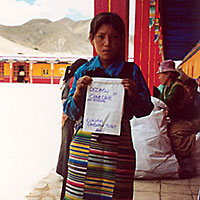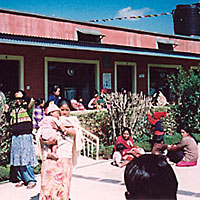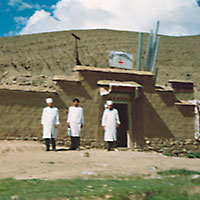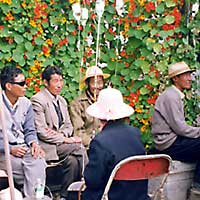Project for people with disabilities – Tibet
Project 2002/2003/2004

Project for people with disabilities
Tibet Project 2002/2003/2004
This project was realised in the years 2002-2003-2004 and was co-financed by the Italian County of Lombardy.
The project was a collaboration between:
- Lama Gangchen World Peace Foundation – Help in Action
- Don Gnocchi Foundation NGO, one of the most important bodies working on behalf of people with disabilities in Italy
- Italian Association for Solidarity between Populations AISPO, the NGO of the San Raffaele Hospital in Milan, Italy, committed to important social and healthcare projects in poor countries
Tibet is one of the poorest areas of the world, especially in the rural regions where the only form of livelihood is that of subsistence farming. Social services, especially those relating to healthcare, are completely lacking in the villages and are minimal in the cities.
In this context, the situation of people with disabilities is particularly difficult: unable to carry out heavy agricultural work and the lack of appropriate rehabilitation and treatment denies many the possibility to play active roles in village life.
This project is based in Tashi Lumpo Monastery Clinic, in the city of Shigatse. Here the monk-doctors, who practice above all traditional Tibetan medicine, receive around 100 poor patients each day who come from the surrounding villages with the certainty of receiving help.
However, these doctors are often impotent when confronted with cases of handicap: many cases are fractures left untreated, which render the person less able as time goes by. Degenerative disease such as b-bone disease is still very diffused in Tibet for unknown reasons and cases of blindness and cataracts are common even amongst the youngest of people due to the strong sunlight, dust and lack of hygiene.
In the Clinic experts from the Don Gnocchi Foundation, who stayed at the Monastery, taught monk-doctors physiotherapy and about the rehabilitation of people with disabilities. Now, these monks are able to offer concrete help to these patients who have had to wait for a long time.
Photo Reportage: Disabled Project in Tibet
- Closing Ceremony
- Party at Tashi Lumpo Clinic
- Young Patients
- Tashi Lumpo Clinic
- Vocational Training Centre
- Handicraft Workshops
- Village Life
- New services bringing hope
Himalayan Healing Center – Kathmandu – Nepal

Himalayan Healing Center
Kathmandu – Nepal
This Clinic situated in the outskirts of Kathmandu in Nepal, in the same complex where the Association is based, provides minimal cost healthcare to the poorest and most needy of the local population.
The Clinic offers allopathic medicine alongside traditional Himalayan medicine and is composed of five consultation rooms offering general medicine, dental care, family planning and reproductive health services, as well as facilities for ophthalmology, ENT and homeopathy.
The Clinic has a full-time Nepalese staff.
In 2004, the Clinic offered medical care to approximately 16,000 people at a minimal charge or with no cost. In July, during a week-long medical camp, 800 people were treated completely free of charge.
The Clinic also acts as a base for important community health programmes promoted by Nepal’s Ministry of Health such as: the Dots (Directly Observed Treatments) for patients with tuberculosis; the national campaign against polio, still common in some areas, and the vitamin A programme. The diet of many poor families in Nepal consists almost exclusively of rise and lentils and is therefore lacking in many essential vitamins such as vitamin A that can cause serious health problems including blindness. This vitamin is now administered periodically to children and is sufficient to avoid a lot of suffering.
The Clinic also participates in immunization programmes that aim to protect children against preventable disease such as polio, hepatitis and measles.
The Clinic needs funds to buy medicines and equipment, as well as to continue financing educational healthcare activities in the local community.
Village Dispensaries – Tibet

Village Dispensaries – Tibet
The health problems in the villages of Central Tibet are serious and widespread: malnutrition, sicknesses caused by the use of contaminated water, tuberculosis and lung diseases such as pneumonia, lack of childbirth and maternity facilities, untreated fractures (which leave people disabled for life), eye problems (cataracts and blindness) are common even amongst small children caused by the strong sunlight and dust, total lack of dental facilities.
It is of utmost importance that the inhabitants of these villages have at least a basic medical assistance to count upon, because their state of health is often already weak due to the climate, diet and contaminated water. The healthcare structures of the city are too expensive and difficult to reach, and often those who are sick remain without any kind of help.
The Association already constructed, some years ago, a dispensary in Gangchen Village, the first in an area that has been completely without any kind of formal medical assistance for many years. There is a resident Tibetan doctor who makes use of traditional Tibetan herbal remedies and who visits regularly, often by foot or bicycle because there are no means of public transport, another 15 villages in the surrounding area.
In 2005 thanks to funds collected a new and bigger dispensary has been built in the nearby Singma-Gangchen Village: it is an ample building with a large courtyard situated next to the main road that runs from the cities of Lhasa and Shigatse to the border of Nepal. Even though it is a dirt road – at this time however there are road works underway that will make a great improvement – it is one of the main roads in Tibet and as such makes the dispensary very easy to reach from many other neighbouring villages. The Tibetan doctor and his family are already living in the new building, which will substitute the older and smaller dispensary in the nearby Gangchen Village.
The local people are extremely happy to have access to this medical assistance and the fact that it is available from Gangchen, where monk-doctors have for centuries assured everyone of medical care, is also very meaningful to them.
Other small dispensaries have also been built in the villages of Redu Lamoshan, Tsarong Shan, Sakya Tonda Shan, Macha Pulchung Shan and Lunak Shekar.
A donation from the Italian company Chiesi Farmaceutici in 2005 was used to realise a dispensary in Nepu Village, an area completely without medical assistance. Thanks to the commitment and enthusiasm of the building coordinators and labourers, the construction was almost completely finished in August of the same year. The building is located about 500 metres from the newly built Nepu School, in the direction of nearby Shishung Village and of other villages that are all connected by a dirt track. These villages will also be able to access the new services. There is a waiting room, a consultation room, a larger room that will provide bed places, a storeroom for medicines and materials and two rooms for the doctor and his family.
Tashi Lumpo Monastery Clinic
Shigatse – Tibet

Tashi Lumpo Monastery Clinic
Shigatse – Tibet
Tashi Lumpo, founded in the 16th century, is one of the largest monasteries of Tibet and the traditional seat of the Panchen Lama; it can be found in the city of Shigatse, the second largest city in Tibet, and is home to approximately 800 monks.
In this clinic, makeshift and extremely poor, are the only medical facilities available to many of the poor inhabitants of the local area. The monk-doctors, who practice traditional Tibetan medicine but also have some knowledge of allopathic medicine, receive around 150 patients each day and treat them all for a minimal charge.
In one part of the Clinic the monks, after collecting various herbs in the nearby Himalayan Mountains, prepare the remedies of Tibetan medicine. The pharmacy however also has a stock of western medicine, and each person is given the opportunity to choose their preferred treatment.
In 2004, the clinic was provided with the equipment necessary to make a small laboratory for the analysis of blood and urine, long awaited by the monk-doctors, enabling them to improve their diagnostic capacities.
The income the Clinic generates is not enough to cover the cost of purchasing material and medicine; it manages to function thanks to donations. The Association regularly helps this small clinic to cover its running costs.
